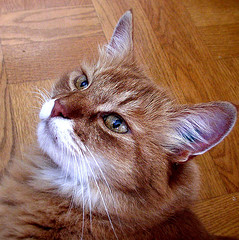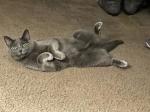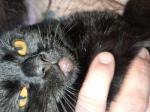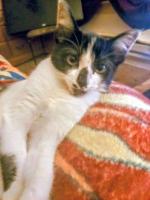A Home Remedy For Cat Constipation Problems
Cat constipation problems are common and may have many of the same causes as human constipation. These may include stress, poor diet, inadequate exercise, and holding it too long when kitty has to go.
That's according to Dr. John Heinerman's book, Low Cost Natural Cures for Your Dog and Cat. Don't forget too, that cat health experts tell us that many cats suffer from chronic dehydration.
Combine that with hairballs, and your kitty can get some pretty clogged up plumbing. No matter the cause, Dr. Heinerman has a simple natural laxative suggestion for cat constipation.
Your veterinarian may prescribe more traditional methods for dealing with a constipated kitty, including hairball remedy food, mineral oil based laxatives, and lactulose.
In contrast, Dr. Heinerman recommends olive oil as a natural alternative. One-half teaspoon of olive oil, twice a day, mixed in with your cat's food, will stimulate the colon and loosen impacted fecal material, says Heinerman.
Now, because I know not all remedies work in all cases, let's look at some other things you can do to help your constipated cat get unclogged.
Other Remedies for Constipated Kitties
In addition to the olive oil trick, another natural remedy for this all too common problem is one-half teaspoon of powdered psyllium seed mixed into your cat's food twice per day.
Heinerman also recommends fresh or dried fruits, such as figs, dates, prunes, bananas, and berries.
Another recommendation is oat, wheat, or barley grass, mixing one-half teaspoon with every feeding. You can grow these grasses for your cat to chew on as well. This is often sold as "cat grass," and can be purchased from Amazon.
Note: Before feeding any food or plants to your cat, check with your veterinarian to be sure of the safety of that. Many people are surprised to learn that some people food, like grapes and raisins, are poisonous to cats, as are varieties of lily.
The ASPCA Animal Poison Control Center has more information on this.
Encouraging your cat to drink more water is always beneficial, of course, and there are a number of pet fountain products on the market that can help with that.
If your cat experiences problems defecating, or seems to be having discomfort while doing so, your veterinarian should be involved. Bowel obstruction is highly dangerous and may require surgery. Only a qualified vet can diagnose and treat it.




Comments: What do you think?
Have your say about what you just read. Leave me a comment in the box below.